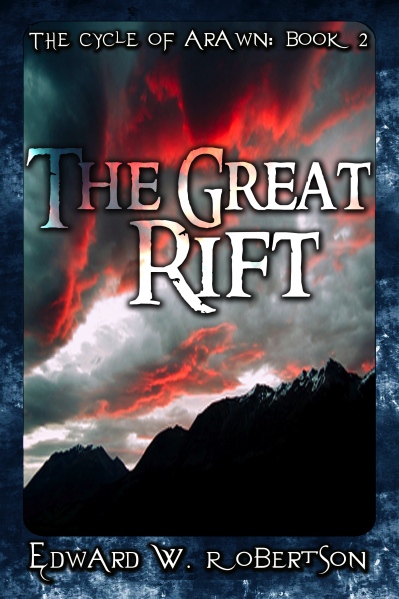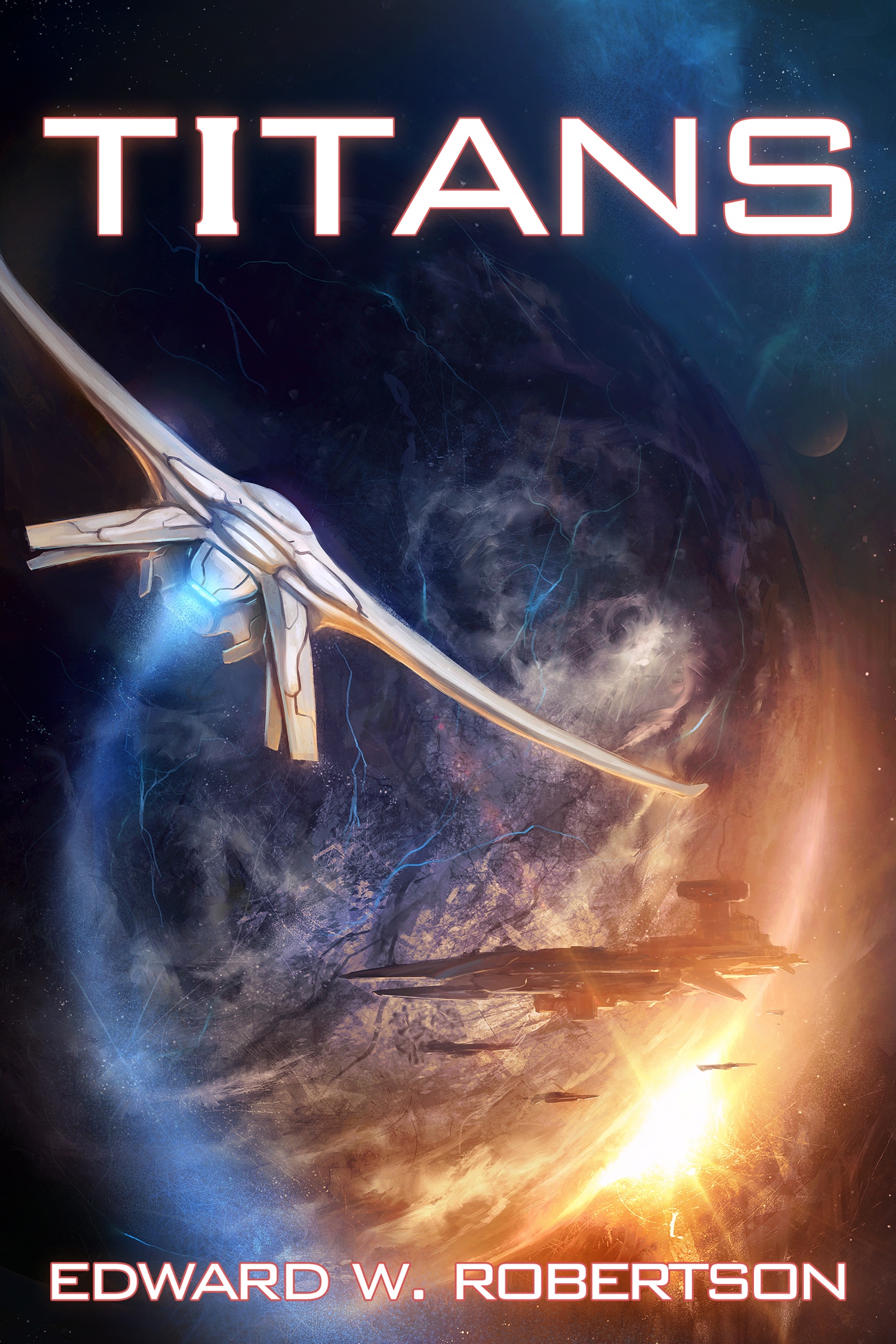Perhaps you’ve noticed I haven’t been posting much this month. Or perhaps you haven’t noticed anything different! We all have our own priorities. But I haven’t been posting, mainly because I’ve been nipples-deep in another project: putting the finishing touches on my newest novel, The Great Rift.
The Great Rift is the second book in my epic fantasy series The Cycle of Arawn. To celebrate its release, the first book The White Tree is currently free (and will be so for the next few days).
Meanwhile, The Great Rift is just $2.99, half off its regular price of $5.99.
According to Amazon, The White Tree is 417 pages long (150,000 words), and normally sells for $4.95. The Great Rift is a whopping 575 pages (nearly 200,000 words) and will normally sell at $5.99. In other words, that’s nearly 1000 pages of epic fantasy for $2.99, or 73% off. Numbers!
This is the first time I’ve had the first clue what to do with a new release. If you like what I do on this blog–you know, the numbers and such–and The Great Rift sounds like it might be worth a read, consider its purchase an investment in future content. The more I sell, the more I learn about how to sell! The more I learn, the more I can talk about what I’ve experienced and what you might try for yourself! Everyone wins and gets rich and life is wonderful forever. This is how you sell something, right? Insane promises?
Anyway, some discussion of price, strategy, etc. after this lovely picture of the cover (artwork by Char Marie Adles):
So, when most indie books are $2.99 or $3.99, with a handful doing battle at $4.99, why $5.99? Well, because this book is super damn long. I worked the better part of 8 months on it. 200,000 words is a lot of words. As it turns out, it is 200,000 of them. To put it in different terms, that’s 2-3 times as long as most of the books written these days. From a financial, conquer-the-world standpoint, it would have been smarter to split it in half and sell two books at $3.99 or $4.95. But that would have messed with the story. It would have made it worse, I think. I don’t want to make my books worse.
So I’m hoping people won’t be put off by the fact it costs $1-3 more than many indie books. It’s twice as long, after all, and if I know one thing about writing, it’s that volume is the only thing that matters!
In general, “hope” is not a great business strategy, but I’ve spent the last month selling Breakers at $5.99 and $7.99, which has proven to me that.. I can sell Breakers at $5.99-7.99, when it has plenty of Amazon visibility behind it and 59 generally positive reviews in a completely different genre than The Great Rift. But I have also learned $5.99 is not necessarily a death sentence. Maybe I can sell there.
And if I can sell there, then I can justify writing books this long. And if I can’t sell there, well.. bummer. Because I think this book kicks ass. And I really want to write the finale to the trilogy.
The underlying point is this: I talk a lot about numbers and algorithms and strategies. At times it probably sounds very calculated and mercenary. Like min-max gamers in World of Warcraft who’ve forgotten how to have fun. Examining this stuff is very fun to me, because there is an underlying logic that can be brought to life if you look closely enough and long enough.
But that’s not ultimately why I do this. I do this to write cool books. Books I can be proud of. (When I’m not overcome by Acute Author Shame Syndrome, at least.) If you’re a writer, I bet you feel exactly the same.
When I’m prattling on about the numbers, then, and the numbers tell you to do one thing but your instincts as a writer tell you to do something different–ignore me. Forget the numbers. Do what makes you happy. This is supposed to be your dream job. Treat it as just that.
Yesterday, Joe Konrath and Blake Crouch put up an interesting post on Amazon’s Select program. The gist is that, with the emergence of viable alternative ebook stores besides Amazon, staying exclusive to Amazon by participating in the Select program is no longer worth it.
I’d qualify that a bit: staying exclusive to Amazon is no longer worth it for bestselling authors J.A. Konrath and Blake Crouch.
I’m sympathetic to their message. For 98% of participants, Select is no longer as powerful as it used to be. It doesn’t rack up the sales like it did just a few months back. Meanwhile, over the last couple years, Amazon’s share of the ebook market has decreased from around 90% to 60% or less. Still huge, in other words, but the other stores are no longer irrelevant. To put it in perspective, let’s look at a completely hypothetical example. Say you’ve got a book that will earn $300 through Amazon each month. Back when Amazon had 90% of the market, you’d only expect to earn another $33 by distributing to all the other stores. These days, having it available everywhere would make you another $200 per month. In an environment where gaining the perks of Select only means giving up 10% of the market, it’s a pretty easy call. When that exclusivity means giving up 40%, it’s a completely different story.
Blake illustrates this by his experiments with Barnes & Noble and Kobo. By enrolling in the Nook First program with his latest book, Eerie, he was able to sell 1500 books in a month of exclusivity–pretty good. Far better than he would have done for the Nook without the advertising and placement B&N gives its Nook First authors.
With another book, Kobo offered him a real promotional flurry–“email blasts, coupons, and prominent placement on their landing pages”. He didn’t have to go exclusive with them, and he was still able to hit the top 10 on Kobo. That month, his Kobo earnings on that title nearly matched what it made on Amazon.
This sounds really good. Much better than the dwindling returns of Amazon Select. But then again, of course it sounds good: this is Blake Crouch we’re talking about.
Blake Crouch can get into Nook First. Blake Crouch can get a massive advertising push on Kobo. Can you? Without those resources at your disposal, how do you really think you’ll do on the other stores? Better than you’d do than if you stayed in Select?
This doesn’t mean I think Select is still the end-all and be-all in the indie world. Kobo is very interesting, and some people do well on B&N. Despite my recent success with it, I’m growing increasingly disenchanted with Select myself; a week back, I scheduled a two-day free run for Breakers that had a good shot restoring its sales, but the promo didn’t begin until 2 AM on the second day. I emailed, called, and emailed Amazon again to reschedule my lost free day for the following day, but they didn’t respond until it was too late. The giveaway went decently, but without that second day, it didn’t do nearly as well as it would have. I gave away some 5600 books; with another day, I probably would have done 8-9K. In my position, that could have been huge. Amazon’s slow customer service cost me hundreds, possibly thousands of dollars.
Guess who’s pretty interested in Kobo and iTunes right now?
But I’m still not pulling everything from Select right away. I have a plan for one of my books that hinges on what Select offers. Select can still help that book better than anything I’m aware of through iTunes, B&N, and Kobo put together.
We’re not all Blake Crouch. I’d like to be Blake Crouch. It would be much easier to make these kinds of decisions when the other stores are willing to put so much marketing muscle at your disposal. In the interest of full disclosure, the only reason I’m leaning toward pulling one of my books from Select is I’ve had an offer–at a much, much smaller level–that would provide it with some visibility there. That, combined with my growing disenchantment with Select, makes me inclined to experiment.
The bottom line is very much a matter of common sense: if Select isn’t getting you much in the way of results, you should totally try the other stores and see what happens. Experimentation is key. You have to fail and fail and fail until you find what works. But if Select is helping, even modestly, or you have a strategy to make it start working for you, then you should probably stay exclusive for now.
Blake gets at that in their post, actually. He concludes by saying that he doesn’t have definitive answers, that the real answer is to experiment and adapt–but Joe pushes harder against Select. He no longer thinks exclusivity is worth it.
Well, maybe not for him. But it still might be for you.
I will improve this writeup tomorrow. But it’s been a long day, and I need to collapse. In brief, then, a dozen of us indie fantasy writers are doing a one-day Kindle giveaway of some of our books. This runs the classic fantasy gamut–epic, historical, urban. Below are the authors involved, as well as a link to the Amazon pages where their books may be downloaded. Goodnight!
EDIT: Here’s a much nicer link, including snazzy covers, to all the free books.
Also, the list:
Dave King: Betrovia
Edward W. Robinson: The White Tree
Cate Dean: Last Chance Jack
Colin Taber: Fall of Ossard
Matthew Musser: Jadeflies
S. M. Reine: Death’s Hand
Brendan Carroll: The Red Cross of Gold
E. Stoops: Corner of a Round Planet
MeiLin Miranda: Lovers and Beloved
Tristan J. Tarwater: Little Girl Lost
J. R. Tomlin: Blood Duty
Christopher Bunn: Ice and Fire
Kate Danley: Maggie for Hire
Enjoy!
That’s right. Available in just about every electronic format under the big yellow sun, The Zombies of Hobbiton: A Martian Love Story is currently free at Smashwords.
It’s a fast-paced horror-comedy novella of about 85 pages, and it won’t be free forever. So go forth! Download! Tell your buddies! Leave reviews! Be fruitful and multiply! Etc.!







